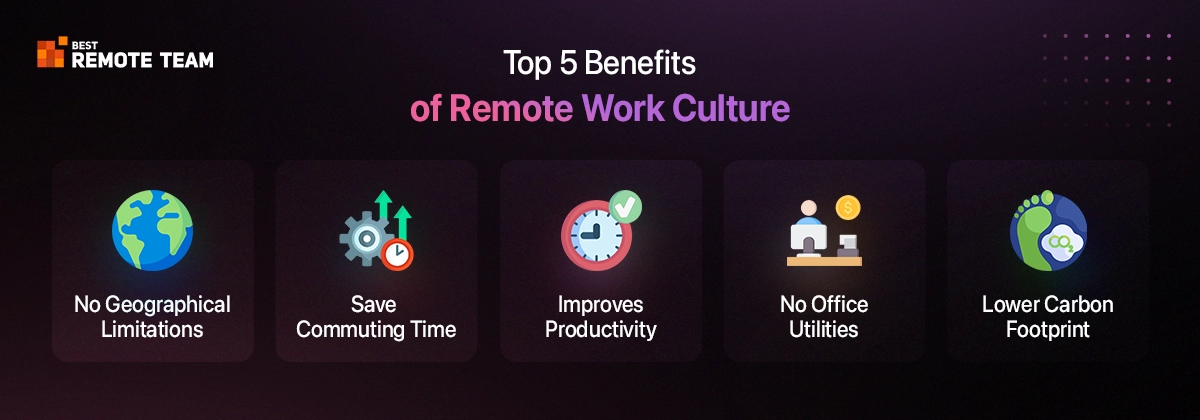What is a Remote Work Culture?
The Covid-19 pandemic forced many countries to shut down their offices completely. Many countries were locked down to stop a deadly virus from spreading. Obviously, businesses cannot stop working and so they have allowed their employees to work from their homes.
After the lockdown, some companies have asked employees to start coming to the office and some companies continued the remote work culture as they have already experienced the benefits of this model.
In short, a remote working culture is a norm where employees work from their homes and not from offices. You should not assume that the model offers only benefits, this model also has some drawbacks as well. Let’s check out the benefits and drawbacks of this model.
5 Benefits of Remote Work Culture
1. No Geographical Limitations for Employers
Yes, you can hire someone located far away from your country and you can hire him. There are no geographical boundaries. You can have the best pool of talent for your projects.
Also, most employees have their laptops and other tools. You can save operational costs to a great extent.
However, for some specific profiles, you might need to facilitate them with the system, tools, and technologies.
2. Employees Can Save Commuting Time
This is a big relief for employees who used to spend at least an hour or so to reach their offices earlier. Now, they don’t have to commute to the office and they can utilize this time to focus more on work.
Also, traffic, noise, and other commuting parameters don’t disturb the mental health of employees. So, they are fresh and energetic to work for you.
3. Improves Productivity of Employees
When you are working from your home, you are in your comfort zone. Also, you don’t have to address office issues and other interruptions at home. Hence, it is also reflected in your work as well.
Your productivity and efficiency will increase to a great extent. You will work with more focus and determination.
4. No Office Rents and Parking Spots
For employers, they might get rid of huge office rents and other overhead costs as your staff is working from home.
Also, you don’t need to hire parking spaces for your office workers. It might give you some relief from monthly overhead and operational costs.
5. Lower Carbon Footprint
The remote work culture means fewer cars and motorbikes on the road and fewer working ACs.
It will lower the carbon footprint on the earth. By promoting a remote work culture, you are helping the environment.
Remote vs. In-House Teams: Which is Better for Your Business?
Here are the key pros and cons of remote teams vs in-house teams:
Remote Teams
Pros
- Access to a wider talent pool without location restrictions
- Increased productivity and focus with fewer distractions
- Lower overhead costs like office space and utilities
- Improved work-life balance and employee morale
- Ability to operate 24/7 across time zones for faster turnaround
Cons
- Communication challenges and lack of face-to-face interaction
- Difficulty building trust, unity and company culture
- Higher chance of errors without in-person oversight
- Challenges with employee onboarding, training and management
- Potential legal issues with employees in different countries
In-House Teams
Pros
- Easier communication and collaboration in a shared physical space
- Stronger company culture and team bonding
- More direct oversight and management of employees
- Streamlined onboarding and training processes
Cons
- Limited talent pool based on location
- Higher overhead costs for office space and amenities
- More distractions and less focused work time
- Potential for micromanagement and less flexibility
In summary, remote teams provide access to global talent, cost savings and flexibility, while in-house teams enable better communication, culture and oversight. The optimal choice depends on the specific needs and priorities of the organization.
Remote Development Teams: Key Challenges and Proven Solutions
Here are the key challenges and solutions in managing remote development teams:
1. Communication Breakdowns
Solution: Utilize a variety of communication channels (video calls, instant messaging, project management tools) and establish clear communication protocols.
2. Lack of Face-to-Face Interaction
Solution: Schedule regular virtual team-building activities and one-on-one check-ins to maintain personal connections.
3. Monitoring Productivity and Progress
Solution: Focus on tracking outcomes rather than activity, use project management tools, and set clear goals and deadlines.
4. Onboarding and Training Remote Employees
Solution: Develop comprehensive online onboarding programs and leverage video tutorials, screen-sharing, and virtual training sessions.
5. Maintaining Company Culture and Collaboration
Solution: Foster virtual social interactions, recognize achievements, and encourage team members to share knowledge and best practices.
6. Managing Across Time Zones
Solution: Establish core overlapping work hours, use scheduling tools, and be flexible with meeting times.
7. Technical Issues and IT Support
Solution: Provide reliable hardware and software, offer tech support, and have contingency plans for outages.
8. Lack of Work-Life Balance
Solution: Set clear boundaries, encourage breaks, and promote healthy remote work habits.
9. Addressing Conflicts and Providing Feedback
Solution: Overcommunicate, be empathetic, and use video calls for more personal interactions.
By proactively addressing these challenges with the right strategies, organizations can effectively manage remote development teams and ensure their success.
Top 5 Tools for Remote Team Collaboration and Management
Based on the search results, here are the best tools for remote team management:
1. Communication and Collaboration
- Slack – Team communication and collaboration
- Zoom – Video conferencing and screen sharing
- Google G Suite – Cloud-based productivity and collaboration tools
2. Project Management
- Trello – Visual project management and task tracking
- Asana – Project management and task organization
- Microsoft Teams – Integrated communication and collaboration
3. Time Management and Productivity
- Status Hero – Asynchronous check-ins and progress reporting
- TimeZone.io – Time zone management and meeting scheduling
- TMetric – Time tracking and productivity monitoring
4. Employee Engagement and Culture
- Culture Monkey – Anonymous employee feedback and pulse surveys
- Officevibe – Employee engagement and feedback platform
- ProofHub – Project management with built-in communication
5. Expense Management
- Fyle – Automated expense reporting and reimbursement
These tools address the key challenges of managing remote teams, including communication, collaboration, task management, productivity tracking, employee engagement, and expense reporting. By leveraging a combination of these solutions, organizations can effectively manage and support their remote workforce.
How to Successfully Manage a Remote Development Team?
1. Communication
Effective communication is the cornerstone of managing a remote development team. Regular meetings such as daily stand-ups, weekly check-ins, and monthly retrospectives ensure everyone stays aligned and on track. Establish clear communication channels using tools like Slack, Microsoft Teams, or Zoom for instant messaging and video calls. In a remote setting, it’s crucial to over-communicate to ensure all important information is shared transparently and promptly.
2. Tools
Utilize the right tools to streamline your team’s workflow. Project management tools like Jira, Trello, or Asana help track progress and manage tasks efficiently. For code collaboration and version control, version control systems such as GitHub, GitLab, or Bitbucket are essential. Maintain comprehensive documentation using tools like Confluence or Notion to ensure that everyone has access to up-to-date information.
3. Processes
Establishing clear and efficient processes is vital for remote teams. Define clear goals and expectations by setting specific objectives, deadlines, and deliverables. Implement agile methodologies like Scrum or Kanban to manage workflows effectively. A robust code review process ensures code quality and facilitates knowledge sharing among team members.
4. Team Building
Building a strong team culture is crucial for remote teams. Organize virtual team-building activities to build rapport and foster a sense of community. Recognize and reward achievements to boost morale and motivation. Support work-life balance by being mindful of time zones and individual schedules, helping to prevent burnout.
5. Productivity
Enhancing productivity in a remote setting involves several strategies. Help team members set up a suitable work environment with the right tools and guidelines. Track productivity metrics focusing on outcomes rather than hours worked to avoid micromanaging. Encourage regular breaks to maintain high productivity levels and prevent burnout.
6. Professional Development
Investing in your team’s growth is essential. Provide training opportunities through online courses, workshops, and conferences. Implement mentorship programs to support professional growth and development. Give regular feedback and create opportunities for team members to share their feedback as well, fostering a culture of continuous improvement.
7. Technology
Ensure your team has access to reliable technology. Provide reliable internet and equipment necessary for remote work. Implement security measures to protect sensitive data and maintain compliance with industry standards. Utilize automation tools like CI/CD pipelines to streamline workflows and reduce manual work.
8. Cultural Considerations
Respect and accommodate the diverse needs of your team. Respect time zones by scheduling meetings and deadlines that consider the various locations of team members. Foster an inclusive culture where diverse perspectives are valued and respected. Be mindful of language and communication styles, encouraging clear and concise communication to overcome language barriers.
By implementing these best practices, you can manage a remote development team effectively, ensuring high productivity, strong collaboration, and a positive work culture.
Conclusion
The remote work model works best for everyone when you approach it carefully. There are times when they might feel low and they expect you to understand it.
When you hire dedicated developers in India, ensure that your working methodology is friendly and transparent with them. Work on the tips discussed in this post and you will find it easier to work with remote workers.





